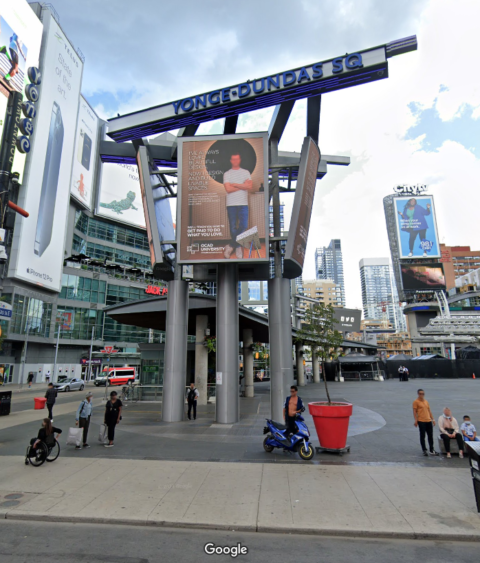In the never-ending quest for moral superiority, the City of Toronto decided to rename a downtown landmark — Yonge-Dundas Square — after allegations were made that British Home Secretary Henry Dundas was against the abolition of slavery in the 1790s. (In fact, it was partly his efforts to mediate between the abolitionists and their opponents that actually got the first anti-slavery bill through Parliament, but who cares about his actual work when we can issue blanket condemnations hundreds of years later?)
In a twist worthy of the Babylon Bee, it turns out that the new and improved name proposed has a much more direct connection with slavery:

The Yonge-Dundas Square sign on the southeast corner of the intersection in downtown Toronto.
Detail of an image from Google Street View.
There is a lot wrong both with the name that Toronto city council chose to replace Yonge-Dundas Square and the burden that the name change will place on taxpayers.
Originally budgeted at $335,000, the new estimate is $860,000 — and who is to say it won’t go higher? That would be a lot of money even for a desirable name, but the name the city chose, Sankofa Square, is problematic.
The term is Ghanaian and means “learning from the past.” But while it is intended to replace the name of Henry Dundas, who some blame for delaying the abolition of slavery in the British Empire, the term “Sankofa” has its own connection to the slave trade.
Slavery was rife throughout Africa, and much of the world, for centuries past, but Ghana’s version included the execution of the slaves of chiefs who died, so that they could serve him in the afterlife. […]
The basic fact, ignored by Toronto’s mayor and city councillors, is that the Gold Coast, the earlier name for Ghana, was a notorious slave society. Leading Ghanaians were prominent in the slave trade and were themselves slave owners. For years after slavery was abolished elsewhere, they fought its abolition in Ghana. It wasn’t until 1874 that the slave trade in Ghana was abolished — nearly a century after Britain.
Compare Ghana’s record with that of Ontario, where a process of gradual abolition was started in 1793, 81 years before Ghana. That, notably, was thanks to the efforts of Upper Canada’s first lieutenant governor, John Graves Simcoe, an appointee of Henry Dundas, no less.
So Dundas was not only instrumental in getting slavery abolished in Scotland, acting as a lawyer in the appeal of a case dealing with a runaway slave, he also sent a dedicated abolitionist to Upper Canada to take the top post. He deserves a better square than Yonge-Dundas!



